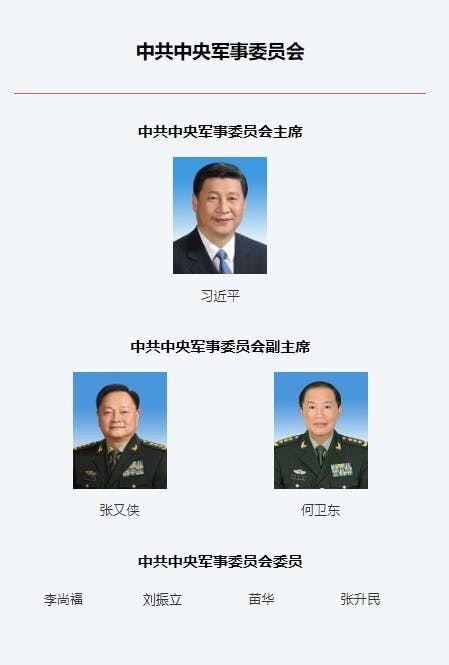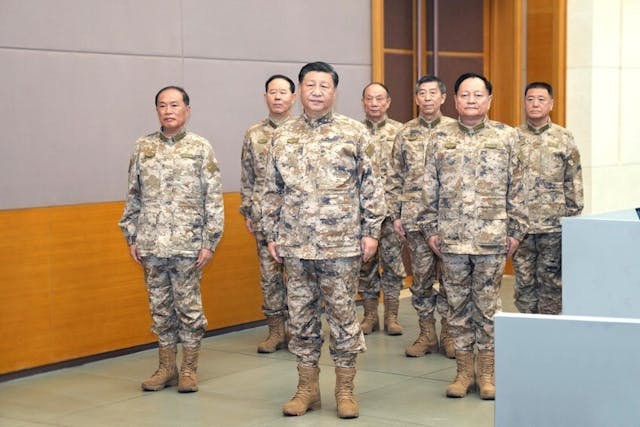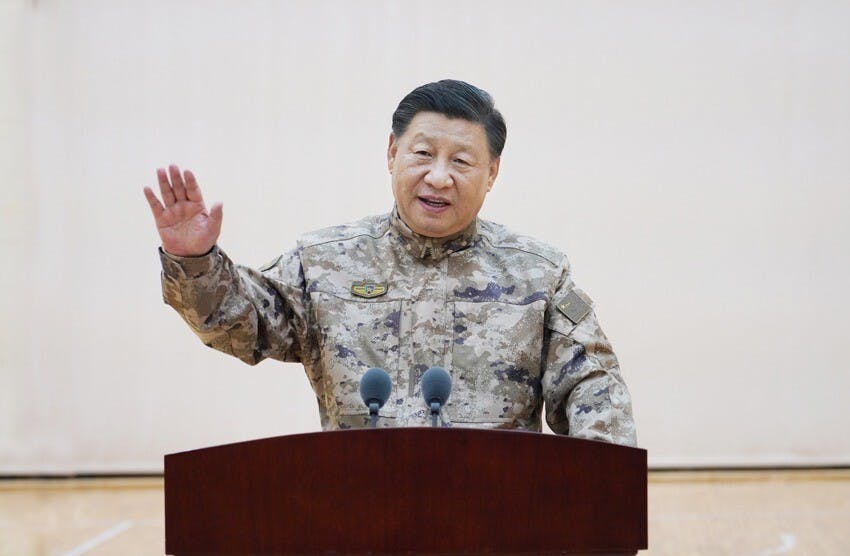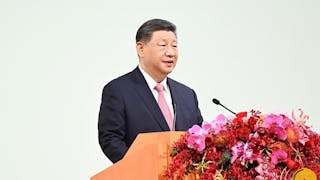中共總書記、國家主席、中央軍事委員會主席習近平在視察軍委聯合作戰指揮中心時,多了「軍委聯指總指揮」的新身份和頭銜──此舉引發外界猜測,中國是否準備好使用武力捍衛其領土利益和主權,包括台灣的未來,是中美之間持續存在爭端的關鍵所在。
仔細觀察二十大以來中共中央軍委的組成,便發現了一些新的和現有的成員,他們的背景值得關注。
張又俠軍事記錄無可挑剔
中國共產黨10月23日公布了7名中央軍委委員名單,其中包括連任的習近平主席和任中央軍委副主席、72歲的張又俠。張又俠是1979年對越南「自衛反擊戰」的老兵,後被提拔為團長。1984年4月,他又投入老山戰役,成功擊退越軍的反攻。
張採取了佔領高山制高點的策略,同時帶領他的119團佔領了越南軍隊的戰略據點──據報道,此舉震驚了越南最高統帥部。1984年6月至7月,越軍整編,對張又俠的119團大舉進攻,119團劃分戰略防禦點,準備充分,在越軍撤退時進行反擊。
張又俠的表現使他在戰後晉升為師長。2005年,張又俠被派駐西南邊防,任北京軍區副司令員。作為在中越戰爭中採取強硬策略的老兵,張又俠繼續擔任中央軍委副主席,反映了他無可挑剔的軍事記錄。
何衛東或是對台小組成員
另一位中央軍委副主席是何衛東,他今年65歲,出生於福建省。曾任駐閩第31集團軍參謀長的豐富經驗,可見他在處理台海問題上的軍事謀劃。後被派駐到南京、江蘇、上海和東西部地區的軍區。2019年,63歲的何衛東達副戰區級退役年齡。2022年3月,他佩戴中央軍委臂章,出席第十三屆全國人大第五次會議解放軍和武警代表團會議。
2022年9月,他在中央軍委聯合指揮中心工作,明顯提升到中央軍委的最高指揮職位。 因此,以他在福建等地區的豐富經驗,尤其是在8月份的解放軍環台軍事演練中發揮了關鍵作用,他在10月的中共二十大中被提拔為中央軍委副主席也就不足為奇了。美國眾議院議長佩洛西對台北的挑釁性訪問後不久,一些以台灣為基地的解放軍觀察人士認為,何衛東出任中央軍委副主席,暗示中央軍委主席習近平可能真的希望用武力來完成對台灣的統一。 此外,據推測,何衛東可能是中共對台領導小組成員之一。

戰略航天專家入局 或為潛在衝突準備
除了具有深厚的福建背景和歷練的何衛東,苗華是另一位在福建出生的中央軍委新成員。 苗華畢業於國防科技大學,主修管理工程,後來專注於解放軍在南京和蘭州軍區的政治工作。苗華的重要之處在於,他於2015年7月成為中國海軍上將。他被任命為中央軍委成員,除了他來自福建省的背景外,可以看作是作為海軍上將的他,政治工作與軍事專長相結合的原因。
中央軍委的新成員,還包括64歲的李尚福,他出生在四川,在戰略支援及航天工程和任務方面具有豐富的經驗。1982年至2012年在西昌衛星發射中心工作,2013年調到酒泉衛星發射中心任參謀長。2016年1月,李尚福被派去領導新成立的解放軍戰略支援部隊。 2022年10月,他是第一位從戰略支援背景入職中央軍委的軍事首長。傳媒猜測,李尚福有可能接替魏鳳和出任下一任國防部長。他在2022年10月作為新成員加入中央軍委意義重大:他在戰略支援和航天任務方面的知識和專長,意味着中國正在為未來的任何高級軍事衝突做準備。
值得注意的是,在現任國防部長魏鳳和的領導下,中國一直在進行軍事外交。2022年6月,魏鳳和在香格里拉對話會上表示,中國反對搞霸權主義、分離主義、拉幫結夥和集團對抗,中國支持和平與多邊主義。魏鳳和在佩洛西8月訪問台北後還強調,「台灣是中國的台灣」,「台灣問題是中國的內政」。 可以預見,魏鳳和的繼任者可能會繼續強調中國反對霸權主義和堅持由中國人自己解決台灣問題的相同立場。
習近平高度重視 軍隊紀委工作
另一位年輕的黨中央成員是58歲的劉振立,他出生於河北,1984年在老山戰役中抵抗越軍的進攻。劉振立曾在砲兵部隊工作,後來成為北京軍區、武警部隊、解放軍陸軍的參謀長。2015年天津港發生大爆炸時,劉某曾被派去搶險救火,這說明他有豐富的危機應對經驗。2021年7月,他晉升上將軍銜。他於2022年10月被任命為中央軍委成員,可被視為加強最高領導層的砲兵和規劃專業知識的舉措。
最後,中央軍委的留任成員是64歲的張升民,他出生於陝西,具有豐富的軍紀處理經驗。張升民在2004年至2016年期間擔任過政治委員,具有很強的背景。2017年1月,他不僅成為解放軍紀委書記,而且成為中央軍委委員。2022年10月,他繼續擔任中央軍委委員,意味着中共和解放軍強調廉奉公的習近平高度重視軍隊紀委工作。

總的來說,中共二十大之後的中央軍委陣容有幾個突出特點;一是成員專業知識廣泛,涵蓋中越戰爭實戰經驗、砲兵、太空任務、戰略支援、戰略規劃、政治工作、對黨忠誠、反腐倡廉、紀律處分等領域,還有離台灣最近省份福建的重要性。習近平總書記在中共二十大報告中強調,國家要保持強大的現代化軍隊。因此,他最近對解放軍強調「全部精力向打仗聚焦,全部工作向打仗用勁」不僅不足為奇,而且繼續強調強軍的必要性是中國共產黨長期執政、維護國家主權和領土完整、在中華民族的偉大複興中堅持不懈的最可靠保障。最重要的是,如果和平解決台灣問題的辦法用盡了,就用武力解決。簡單來說,新的中央軍委組成是中國共產黨如何處理台灣問題的一面鏡子。
China’s New Central Military Commission
When China’s President Xi Jinping inspected the command center of the Central Military Commission (CMC), he used a new capacity and title of being “the central commander of the combined command of the CMC” – a move raising outside speculation of whether China is ready to use military force to defend its territorial interest and sovereignty, including Taiwan whose future belongs to an ongoing dispute between China and the United States.
A closer look at the new composition of the CMC since the end of the 20th Party Congress has revealed some new and existing members, whose background deserves attention.
The Communist Party of China (CPC) unveiled a list of seven CMC members on October 23, including the continuation of chairman Xi Jinping and the 72-year-old Zhang Youxia as the vice chair of the CMC. Zhang was a veteran of the 1979 Sino-Vietnamese war and he was promoted as a brigade commander. In April 1984, he was sent to the battle of Lao Shan during which the Vietnamese army launched a counteroffensive.
Zhang adopted a strategy of occupying the high points of the mountain, while leading his brigade 119 to capture the strategic strongholds of the Vietnamese military – a move reportedly shocking the Vietnamese high command. From June to July 1984, the Vietnamese army reorganized themselves and launched a massive attack on Zhang’s brigade, which was prepared well by dividing itself into strategic defensive points and which made counterattack whenever the Vietnamese army retreated.
His performance made him promoted to be a division commander after the war. Zhang was sent to defend the southwest border areas until 2005, when he was deployed to be the deputy commander in Beijing’s military zone. As a veteran adopting an aggressive tactic in the Sino-Vietnamese war, Zhang’s continuation as the deputy chair of the CMC reflects his impeccable military record.
Another deputy chair of the CMC is He Weidong, who is 65 years old and who was born in Fujian province. He had rich experience in being the chief of staff of the 31st Army which was stationed in Fujian – showing his military planning in dealing with the Taiwan Strait. He was later deployed to the military regions of Nanjing, Jiangsu, Shanghai and the West and the Eastern regions. In 2019, He at the age of sixty-three was reaching his retirement era, but then in March 2022 he was deployed to the People’s Armed Police under the People’s Liberation Army (PLA).
In September 2022, he worked in the CMC’s combined command center – an obvious promotion to the top CMC’s commanding position. As such, his promotion as the vice chair of the CMC during the 20th Party Congress in October was by no means surprising, given his rich experiences in Fujian and other regions, especially as he played a key role in the August PLA military drills surrounding Taiwan shortly after the provocative visit by Nancy Pelosi to Taipei. Some Taiwan-based observers of the PLA believed that He Weidong’s appointment as the CMC vice chair implied that the CMC chair Xi Jinping might really hope to use military force to deal with the mainland’s reunification with Taiwan. Moreover, it is speculated that He Weidong might be one of the members of the CPC’s leading small group on Taiwan.
Apart from He Weidong who has strong Fujian background and training, Miao Hua was another new CMC member who was born in Fujian. Miao graduated from the Defense University and specialized in management and engineering, while focusing on the political work of the PLA in Nanjing and Lanzhou military regions later. What was important about Miao Hua was that he became an Admiral of the Chinese navy in July 2015. His appointment to the CMC can be seen as a result of combining his political work with military expertise as the Admiral, apart from his background from Fujian province.
A new member of the CMC is 64-year-old Li Shangfu, who was born in Sichuan and who has rich experiences in strategic and logistical supplies as well as space engineering and mission. From 1982 to 2012, Li worked in the Xichang Satellite Launch Center until 2013 when he was redeployed to Jiuquan Satellite Launch Center as a chief of staff. In January 2016, Li was sent to lead the newly established strategic the logistic force under the PLA. In October 2022, he was the first military chief from the logistical supplies background to be appointed to the CMC. The media speculated that Li would likely take over from Wei Fenghe to be the next defense minister. Li’s cooptation into the CMC as a new member in October 2022 was significant: his knowledge and expertise in the logistical supplies and space mission meant that China is preparing for any advanced military conflicts in the future.
It is noteworthy that under the current defense minister Wei Fenghe, China has been conducting military diplomacy. In June 2022, Wei said in the Shangri-la Dialogue that China is opposed to hegemonism, hegemonic power, separatism and confrontation, and that China supports peace and multilateralism. Wei also stressed after the August visit by Nancy Pelosi to Taipei that “Taiwan belongs to China,” and that “the Taiwan question is China’s internal affair.” It can be anticipated that Wei’s successor would likely continue to harp on the same themes of China’s opposition to hegemonism and its insistence to resolve the Taiwan question by the Chinese themselves.
Another younger member of the Party CMC is 58-year-old Liu Zhenli, who was born in Hebei and who resisted the Vietnamese army’s attacks in the battle of Lao Shan in 1984. Liu worked in the artillery force and later became a chief of staff of the Beijing military region, the PAP and the PLA’s army force. During the massive explosion of the Tianjin port in 2015, Liu was sent to deal with the fire and rescue – an indication that he had rich experiences in coping with crises. In July 2021, he was promoted as an Admiral. His appointment to the CMC in October 2022 can be regarded as a move to strengthen the top leadership’s artillery and planning expertise.
Finally, a continuing member of the CMC is the 64-year-old Zhang Shengmin, who was born in Shaanxi and who had rich experiences in dealing with military discipline. Zhang had a strong background as a political commissar from 2004 to 2016. In January 2017 he became not only the secretary of the Discipline Inspection Committee within the PLA but also a member of the CMC. His continuation as a CMC member in the 20th Party Congress in October 2022 means that Xi Jinping, who emphasizes clean governance in the CPC and the PLA, attaches great importance to the work of the Discipline Inspection Committee within the Chinese military.
Overall, the line-up of the Central Military Committee immediately after the 20th Party Congress has several prominent features. First, the members’ expertise is wide and covering the areas of real battle experiences in the Sino-Vietnamese war, artillery force, space mission, logistical supplies, strategic planning, political work, loyalty to the ruling party, anti-corruption and discipline, and the important province of Fujian which is closest to Taiwan. CPC General Secretary Xi Jinping emphasized in his report to the 20th Party Congress that China has to maintain its strong and modern military. As such, his recent emphasis on the PLA’s military preparedness is not only unsurprising but also a continuation of his stress on the necessity of the strong military as the most reliable support for the CPC longevity, China’s protection of its sovereignty and territorial integrity, its persistence in the Chinese renaissance, and most importantly the settlement of the Taiwan issue by force if the peaceful solution to deal with Taiwan’s political future is exhausted. In short, the new CMC composition is a mirror of how CPC may deal with the question of Taiwan’s political future.




































